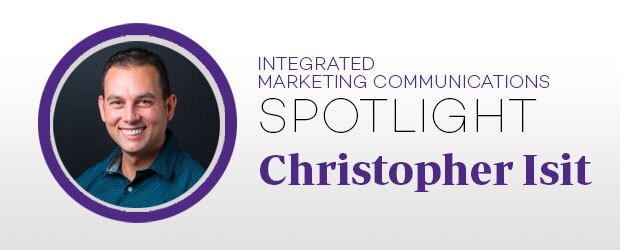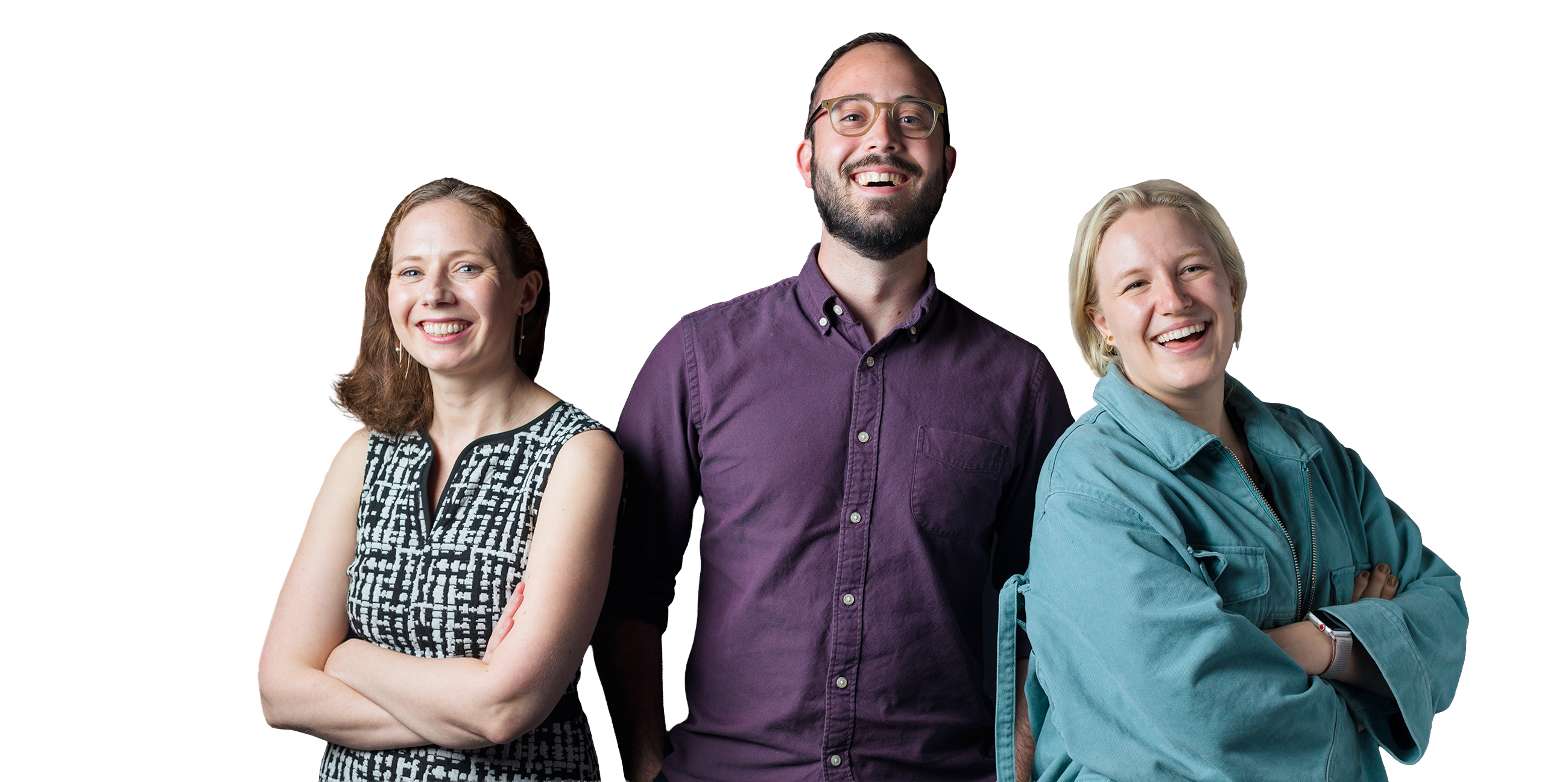“It’s an experience I’ll never forget.”
Christopher I., IMC ‘22, recently spoke with us about Medill’s Master of Science in Integrated Marketing Communications Professional program. With an impressive, multifaceted career to his credit, he’s currently the Senior Content Manager for Amazon, and he offered specific praise for the immersion-course experience at Medill. Excerpts of our conversation follow here.
How has your time in the Medill MS in IMC Professional program helped you build your professional network? What opportunities have you gained through the connections you made here?
“The IMC experience has led to many influential connections throughout the program. Not only was I able to connect with professors who are highly regarded in their field, I was also introduced to many guest lecturers and thought leaders at special events. I have made some really great connections with other students. The best part about the program is the sharing of stories and experiences from other marketing professionals across all industries and at all levels. Whether it is in group projects working on a client problem, or strategizing in an immersive program, I forged many lasting relationships that I will carry with me far beyond the completion of the program. There is a certain vibe that we ‘IMC-ers’ have: It’s a passion for customer-centric marketing. Through our Medill IMC LinkedIn group, students and alumni share job openings and reach out for career advice.”
For someone who works in communications or marketing, why is the MS in Integrated Marketing Communications a better course of study than an MBA?
“I am often asked, ‘What is the difference between earning an MBA versus an MS in IMC degree?’ It’s something the students discuss quite a bit. It comes down to what is going to propel your marketing career in the long term. I attended an info session when I was applying to both degree programs and the facilitator asked, ‘Do you want to be a CEO or a CMO?’ And that solidified the decision for me. I wanted to be the best marketer I can be with the goal of being a CMO one day.”
The MS in Integrated Marketing Communications courses include a lot of group work and discussion threads. How has that experience helped prepare you for leadership roles?
“I think formal education is unfairly thought of as too theoretical. On the other hand, experience and hands-on training are given too much weight without understanding the quality of those experiences. In the MS in Integrated Marketing Communications Professional program, you get the best of both worlds. It cannot be understated how quickly you can gain experience working with a different team, each class, and on a unique set of client problems. At the beginning, you are setting the stage for communication, goal-setting, and tracking performance all while navigating a new team, working with new knowledge each time. Through this experience, you gain confidence in leading a team and navigating difficulties, and ultimately, a proving ground for new ideas. So, when you bring back at work what you’ve learned in class, it isn’t a theory. It’s practical wisdom you’ve worked through with a team and real client.”
What are your thoughts about the caliber of the faculty in Medill’s MS in Integrated Marketing Communications Professional program?
“Every single professor is a wealth of knowledge and an expert in the field. The faculty have curated a curriculum that balances theory with practice and engagement. Before remote learning was a big deal, as it is today, the professors at Medill developed an innovative approach to learning that was far ahead of its time. As intimidating as it might seem to learn from world-class marketers, all of the professors are extremely generous with their time. It was a humbling experience to have so many one-on-one interactions with my professors. It showed the level of passion they have for teaching and the depth of knowledge they have.”
How were you able to customize your studies to meet your unique professional goals?
“One of the best things about the program is that you can step into areas of marketing that would otherwise be out of reach without making a career move. From behavioral science marketing, advanced brand management, media, digital strategy and leadership, to innovation, design thinking, and crisis communications, I was able to gain a breadth and depth of knowledge that would otherwise be unattainable.”
You’ve worked in several different industries. How have your MS in IMC Professional program studies helped you synthesize your diverse career experiences?
“When you work in vastly different industries, you get a diversity in thinking and in how you approach things. The MS in Integrated Marketing Communications Professional program builds on those experiences and does it in a way that embraces innovation and strategy development. It really is about the future of marketing.”
What aspects of your time in the MS in Integrated Marketing Communications Professional program have had the most profound impact on your career?
“The program is designed to put what you learn into practice right away. It’s a deep learning experience because, while you’re perhaps building a case study for a business or client problem in class, the next day, you can apply that to the company you work for and start a whole new initiative that gets you noticed. The program has given me the confidence to seek out innovative strategies and develop areas of marketing that weren't done before. I have quickly leveraged class learning into career growth. Since beginning the program, I have received two big promotions and I’ve expanded my team. I have also forged lasting relationships with other professionals in the field that I feel are like a family. I took two immersive classes—one in Chicago and the other San Francisco. It was a great experience to bond with classmates after class about our careers and help each other grow.”
When we first spoke, you said that you were “searching for a program that put the marketing professional at the forefront of the curriculum, that was flexible, and had real-life outcomes for professional growth.” What did you mean by “flexible” and how has that program’s modality been helpful to you?
“One of the most significant pain points for professionals is balancing an active career and home life. I was looking for a program geared toward professionals that offered both online and in-person experiences. Medill is a leader in higher education because the program leverages learning technology and professors who have curated a curriculum and pedagogy specifically for online learners. Personally, I learn better in an environment that engages multiple intelligences. So, watching a video lecture paired with reading and a discussion board helps me retain the material. Then, when I put together a final project and make a presentation, I’m putting that learning into practice.”
One focus of the MS in Integrated Marketing Communications Professional program is bringing together the disciplines of art and science. Can you describe a Medill project or experience in which you used data to drive creative outcomes?
“I work in digital marketing. Every decision is data-driven and, in many cases, devalues the ‘art’ aspect. The MS in IMC Professional program does a fantastic job of bringing the art and science of marketing together. Faculty members like Kelly Cutler and Roy Wollen teach how to make sense of the data, but they go beyond mere analytics to tell the story. The Integrated Marketing Communications perspective is to be customer-centric and use data to drive innovative ideas that create breakthroughs. It’s a holistic approach to marketing that involves every touchpoint a customer may experience. In leading class discussions, Frank Dudley would often say, ‘Customer experience is the new currency and customer lifetime value is the best way to judge whether or not a company will be successful; a company can increase sales but still be unprofitable.’ Given the recent pandemic and privacy laws, the marketing industry continues to be disrupted. Professors like Jonathan Copulsky, who teaches Consumer Value Innovation, are helping prepare the future generation of marketers.”
You said that you participated in Medill immersion courses. What was the most valuable aspect of those courses for you?
“I attended two immersion courses: Digital Leadership and Design Thinking. In fact, these two experiences are a perfect example of how the program balances the art and science of Integrated Marketing Communications marketing.
Digital Leadership was packed with powerful lessons. We learned essentials like strategic leadership in the digital economy, a standards-and-devotion framework, and the importance of leading with empathy. The course helped me become more effective with change management, persuasive communication through storytelling, people empowerment, and leveraging technology to lead in the digital economy. There was a full day of guest lectures from the IMC program’s top professors and it was a crash course in the innovative work they do: from recommender systems by Ed Malthouse to capital chasing value by finance professor Tony Poidomoni and a talk about the future of IMC by Medill’s Dean Charles Whitaker. I walked away filled with inspiration and tools that will last a lifetime and two notepads filled with takeaways, examples, and further reading.
I got a taste of Design Thinking in the Digital Leadership immersive course and signed up right away. It’s taught by Tran Ha, at the Medill School in San Francisco. Design Thinking for innovation is truly a mind-blowing experience and something that every marketer should study. Design Thinking is about going deep with a few of your targets to find breakthroughs. In marketing, we always look at what the data is saying and take averages to tell us what is working. But what happens when you want to tap into something truly innovative, find the next big thing, solve problems that no one else is thinking of? The process was so freeing, exciting, and yet challenging to master. It’s an experience I’ll never forget. The first day was to practice interviewing random people in public and try to understand them at a deep level in a very short time. It was amazing how much you could learn by being open and asking the right questions. The next day it was meeting with the client and interviewing a few people in our target. Then we took those insights and worked toward finding insights instead of finite solutions. That was probably the most difficult thing to do—we’re so hardwired to find a solution that we pass up the possibilities that may not yet exist. By the end of the week, we had jotted down thousands of insights on boards, on walls, and filtered them through new constraints and possibilities until we made a breakthrough discovery. It was a master class in a systematic approach to harness the power of imagination.”
Immerse yourself in the IMC way of thinking.
Launch your ascent to the CMO’s office in Medill's Master of Science in Integrated Marketing Communications Professional program.
The immersive curriculum centers on understanding consumers and balancing qualitative and quantitative data to build strong brands. Our faculty of innovators and successful marketing executives teach in a live online format that fits with your full-time commitments.
To learn more about the distinctive program, the outstanding career support available to Medill students and alumni, and our application process, contact one of our admissions advisors today.


